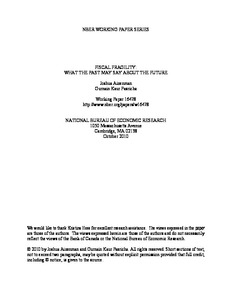Fiscal fragility: what the past may say about the future
"The end of the great moderation has profound implications on the assessment of fiscal sustainability. The pertinent issue goes beyond the obvious increase in the stock of public debt/GDP induced by the global recession, to include the neglected perspective that the vulnerabilities associated w...
| Main Authors: | , , |
|---|---|
| Institution: | ETUI-European Trade Union Institute |
| Format: | TEXT |
| Language: | English |
| Published: |
Cambridge, MA
2010
NBER |
| Subjects: | |
| Online Access: | https://www.labourline.org/KENTIKA-19183516124919017989-Fiscal-fragility-what-the-past.htm |
| Summary: | "The end of the great moderation has profound implications on the assessment of fiscal sustainability. The pertinent issue goes beyond the obvious increase in the stock of public debt/GDP induced by the global recession, to include the neglected perspective that the vulnerabilities associated with a given public debt/GDP increase with the future volatility of key economic variables. We evaluate for a given future projected public debt/GDP, the possible distribution of the fiscal burden or the flow cost of funding debt for each OECD country, assuming that this in future decades resembles that in the past four decades. Fiscal projections may be alarmist if one jumps from the priors of great moderation to the prior of permanent high future burden. Prudent adjustment for countries exposed to heightened vulnerability may entail both short term stabilization and forward looking fiscal reforms. " |
|---|---|
| Physical Description: | 16 p. Digital |

